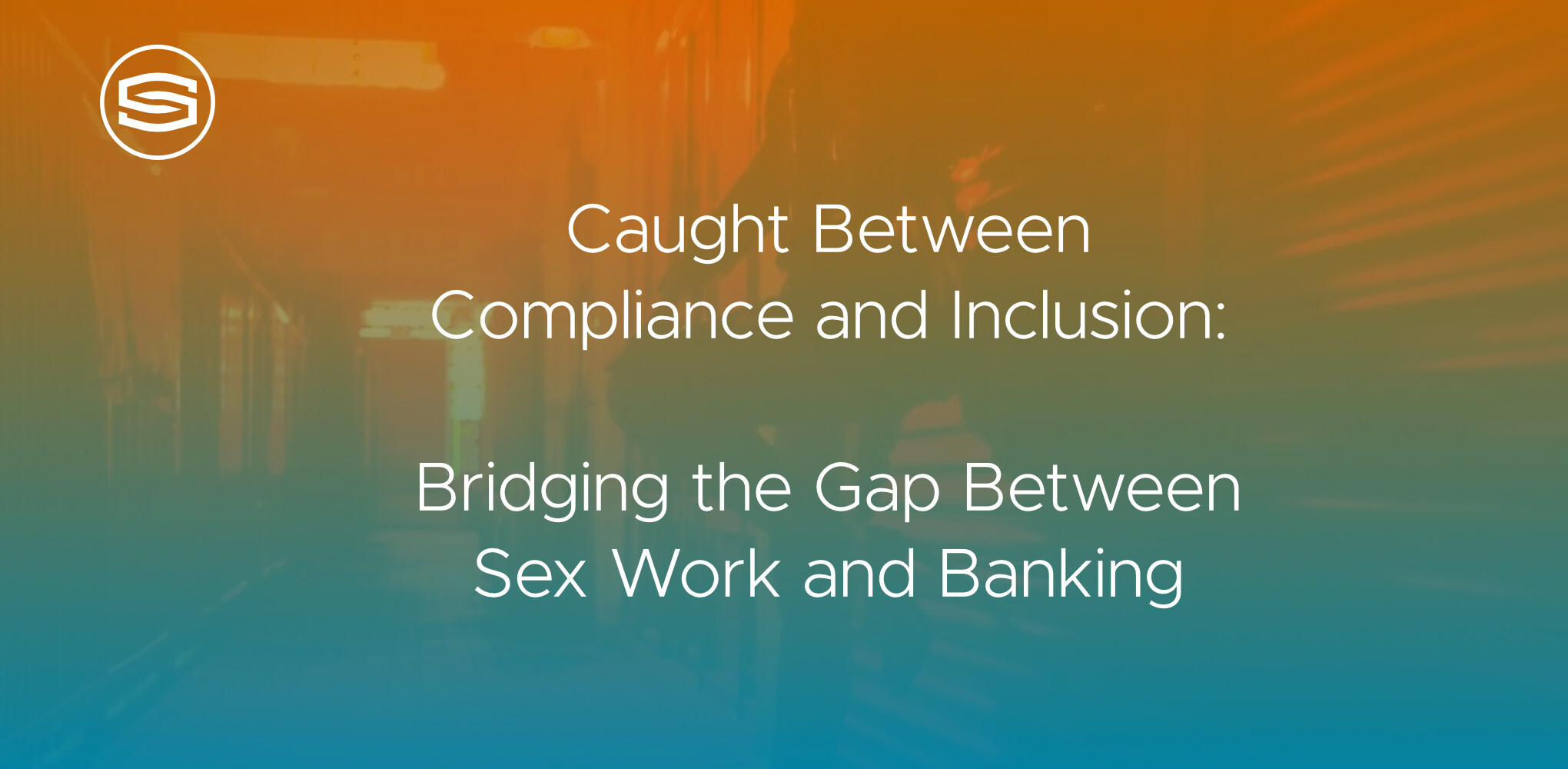
Insights & Opinions
Caught Between Compliance and Inclusion: Bridging the Gap Between Sex Work and Banking
Wed, 09 Jul 2025


As regulators worldwide take steps to improve financial inclusion, one group remains persistently left behind: sex workers. Despite legal reforms in several countries, including Belgium, which recently decriminalised sex work and introduced social protections, many sex workers still find themselves unbanked or underbanked.
At The Banking Scene Conference Brussels, moderator Aliya Shibli (Senior Reporter at The Banker) sat down with Daan Bauwens (Policy and Advocacy Officer at the Belgian Union of Sex Workers, UTSOPI) and Koen Vierendeels (Head of Transaction Banking at Belfius Bank) to explore the conflicting realities between legal recognition and financial exclusion.
What emerged was a frank and thoughtful discussion on stigma, risk, regulation, and the responsibility of financial institutions to balance compliance with inclusivity.
Belgium’s Legal Reform: A Game Changer?
Belgium has made remarkable progress in recognising sex work as a legitimate profession. As Daan Bauwens explained, “We managed to decriminalise sex work in Belgium. It’s the second country in the world that has taken this step.” Prior to 2022, while sex workers and their clients weren’t criminalised, anyone facilitating sex work, such as landlords, accountants, or business partners, was subject to legal action. This made it almost impossible for sex workers to access basic services or operate transparently.
That changed with new legislation that not only decriminalised third-party involvement but also allowed sex workers to work under employment contracts, granting them access to social protection, health insurance, and pension rights.
The legal shift was prompted, in part, by the COVID-19 pandemic, which starkly revealed the vulnerabilities of those outside the formal economy. “The crisis showed how Belgian law, like laws elsewhere, discriminated by denying sex workers the same rights as any other citizen,” said Daan.
The Financial Disconnect: Legal But Locked Out
Yet, despite this legal progress, access to banking remains elusive. Daan shared that sex workers and associated business owners often face rejection when applying for bank accounts or insurance. “If you deny a bank account to someone trying to work transparently and legally, how is this person going to pay social charges?” he asked. The consequence is clear: exclusion from formal banking pushes sex workers back into informal systems, where risks of exploitation, violence, and trafficking increase.
From the banking perspective, Koen Vierendeels made it clear that there is no explicit policy banning sex workers. “We are not allowed to discriminate against a certain sector,” he stated. However, challenges arise during Know Your Customer (KYC) and Anti-Money Laundering (AML) procedures.
Key Concerns for Banks:
- High Cash Volumes: A significant proportion of sex workers’ earnings come in cash, raising AML red flags.
- Transparency of Ownership: Verifying Ultimate Beneficial Owners (UBOs) and ruling out exploitation can be complex.
- Transactional Behaviour: Unexplained cross-border payments or inconsistent income patterns can heighten perceived risk.
As Koen put it, “The more transparent the case is, the higher the likelihood of success.”
The Paradox of Transparency
Ironically, sex workers are often advised by advocacy groups not to disclose the nature of their work when applying for bank accounts. “We tell them: do not mention it, please, because you will probably be refused,” Daan admitted. This leads to a paradoxical situation where banks unknowingly onboard clients without understanding the source of funds, precisely the kind of opacity KYC rules are designed to prevent.
The lack of a formal banking policy around sex work creates further confusion. “Oftentimes sex workers are being denied or accounts are being blocked without any reason,” Daan shared. “Legally, banks are not obliged to give a reason, and many don’t even know themselves.”
Building Bridges: A Call for Policy and Partnership
Both speakers agreed that a formal, transparent framework for onboarding sex workers is urgently needed. Koen suggested initiating a collaborative effort: “We probably need to develop a sort of framework for the sex industry. Ideally, together with the other banks, at Febelfin level.”
Daan welcomed this but stressed the urgency. “If we have to wait for every bank to agree, we might be waiting until 2040,” he warned. Instead, he proposed starting with one forward-thinking bank, perhaps Belfius, which is state-owned, to serve as a proof of concept. “We can go hand-in-hand with one bank, show the best practice. This is the way you can do it.”
Interestingly, he pointed to a successful example in the Netherlands, where a standardised framework for sex workers already exists and is being used by many banks that also operate in Belgium. “There is no reason why we can’t do the same here,” he said.
Overcoming Institutional Barriers
When asked what’s holding back progress, Koen cited a general unfamiliarity with the sector: “We never discussed internally: should we do something special for the sex industry? It’s not that we don’t want to, we just didn’t know the issue was this big.”
Yet another complication lies in reputational risk. Correspondent banks routinely survey institutions on the sectors they serve, including sex work. While this isn’t automatically disqualifying, multiple 'yes' responses may flag a bank as higher risk. “It gives a certain profile,” Koen admitted, referencing the Wolfsberg questionnaire on financial crime.
Even so, there are degrees of nuance. As Daan pointed out, banks can indicate whether they “restrict” engagement with certain sectors, rather than outright prohibit it, offering a more balanced response that acknowledges risk without defaulting to exclusion.
Recommendations: A Way Forward
For Banks:
- Develop a Clear Internal Policy: Even a basic framework would reduce ambiguity, standardise decision-making, and empower front-line staff.
- Engage in Sector-Wide Collaboration: Work through Febelfin to align on best practices, similar to the approach taken with the diamond industry.
- Improve Communication and Transparency: Let applicants know what is required (e.g., proof of registration, expected cash volumes, pattern of cross-border remittances (to family), etc.) to reduce fear and misunderstandings.
- Minimise Reliance on Cash: Encourage the use of electronic payments, virtual wallets, or prepaid cards to mitigate AML risks (although it is acknowledged that this might not currently be accepted by clients looking for the anonymity provided by cash).
For Advocacy Groups and Sex Workers:
- Promote Electronic Payment Solutions: Offering clients the option of privacy-protecting electronic payment methods could shift behaviour over time.
- Use the Basic Banking Service: While imperfect, Belgium’s Basic Banking Service has improved and now offers capped fees (€420/year), making it a viable fallback.
- Engage in Constructive Dialogue: Continued collaboration with individual banks and financial industry bodies is key to developing trust and long-term solutions.
A Leap of Faith—From All Sides
Both parties acknowledged that bridging this gap will require trust. “We understand that opening their doors to the sex sector takes something from banks,” said Daan. “But we have best practices from abroad, and the sky didn’t fall on their heads.”
Koen echoed this sentiment, closing on an optimistic note: “If there’s one thing we learned from this debate, it’s the fact that there is no policy for sex workers and it’s always better to have a policy than not.”
Conclusion
The panel discussion laid bare a stark disconnect: sex work may be legal in Belgium, but financial inclusion for sex workers is far from guaranteed. To close that gap, both banks and the sex work community must move beyond assumptions and toward collaboration.
Banking professionals must remember: inclusion isn’t a risk to be mitigated, it’s a responsibility to be embraced.
In doing so, they won't just be complying with the law, they'll be upholding the spirit of it.



